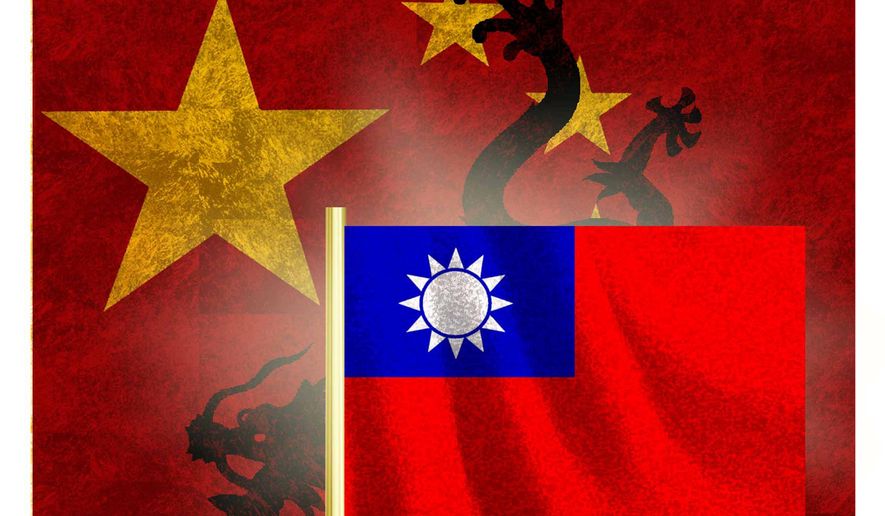OPINION:
While the world’s eyes are focused on Russia’s invasion of Ukraine, Americans should not lose sight of a key event that occurred on Feb. 21, 2022. On that day, Russian President Vladimir Putin signed two decrees recognizing the “Luhansk People’s Republic” and the “Donetsk People’s Republic.”
These declarations asserted that provinces once part of Ukraine are now independent and sovereign states. Mr. Putin’s decision to sign on Feb. 21 was not a random date. It also happened to be the 50th anniversary of President Richard Nixon’s historic arrival in Beijing, the People’s Republic of China, in 1972.
On that day, the PRC’s massive propaganda apparatus commemorated Nixon’s “hand-shake across the Pacific” because it symbolized the opening of formal relations between America and the PRC and because it set in motion the perception that Taiwan has always been a part of China. The predominate PRC propaganda narrative focused on declassified U.S. documents stating that Nixon in private unequivocally told his PRC interlocutors (Zhou Enlai and Mao Zedong) that “Taiwan is a part of China.”
For the next 50 years, every American’s presidential administration has adhered to this mythology, which was enshrined after formal recognition of the PRC in 1979 as the “One China Policy.”
Over the decades, the “One China Policy” has been the focus of wordsmiths from both Beijing and Washington. The latter eventually asserts a “strategic ambiguity” policy regarding America’s recognition of Taiwan’s sovereignty as an independent democratic nation.
America’s “China Hands,” who occupy key positions in the State Department and academia, have advised every presidential administration that strategic ambiguity toward the recognition of Taiwan must never be changed as it will provoke the PRC into an invasion of Taiwan or worse: a war with the United States.
Recall as well that on Feb. 4, 2022, Mr. Putin and Chinese President Xi Jinping, who were meeting in Beijing under the auspices of the opening ceremony for the 2022 Winter Olympics, released a historic 5,000-word joint statement making clear that Russia and the PRC are aligned on the same side of history. They asserted that the balance of power in the world is shifting toward their ideology of authoritarianism.
The statement also made it clear that both nations have “strong mutual support” for their “state sovereignty and territorial integrity” and that they “oppose interference by external forces in their internal affairs.”
Yet this joint declaration has been nullified with Mr. Putin’s recognition of LPR and DPR as independent states and his subsequent invasion of Ukraine. It is time for American foreign policy experts to jettison the policy of “strategic ambiguity” regarding Taiwan.
This policy has paralyzed our foreign policy and national security for too long. It is now time to use this “declaration” tactic as a preemptive diplomatic weapon against the PRC’s threats against Taiwan. By the U.S. declaring Taiwan as an independent and sovereign state, Mr. Xi’s strategic calculus and the timeline for the “Great Rejuvenation” of the PRC will be disrupted and its invasion plans delayed.
Given what is in effect an alliance between Mr. Xi and Mr. Putin and the existential threat this alliance poses to America and the world’s democracies, the Biden administration must take dramatic steps. To stop Mr. Putin’s advance into Ukraine and future conquest of the Baltic States and foreclose any sense of strategic opportunity Mr. Xi might perceive, President Biden must apply innovative and forward-thinking asymmetric pressure to the Chinese Communist Party’s “core interest” regarding Taiwan.
By applying this metaphorical “electrode” to Mr. Xi’s “sensitive area” and turning up the amps, can we reasonably expect Mr. Xi to reach out to Mr. Putin and get him to back off? Yes. If Mr. Biden makes such a bold move and begins acting like one of the great statesmen of history, the president of the United States would provide assurances to the Indo-Pacific region that America will not sit by and allow the PRC to conduct a similar unopposed invasion of Taiwan.
American foreign policy elites talk endlessly about a “whole of government” solutions to “wicked hard” foreign policy challenges but rarely do these same so-called experts ever seem capable of breaking out of the old ruts of past policy constraints, such as the “strategic ambiguity” policy towards Taiwan.
Fifty years on from Nixon’s historic visit to the PRC and decades of engagement and appeasement to the CCP, it is time for America to stand up and lead. By recognizing Taiwan as a sovereign and independent state, pressure will be applied against the two dictators advancing the ideology of totalitarianism.
There are only two reasons why an American president would not adopt such a policy: fear and weakness. The China Hands of the American foreign policy community have preached fear at the idea of ending the policy of strategic ambiguity towards Taiwan. The China Hands community has fastidiously ensured each U.S. administration has been advised that ending the U.S. policy of strategic ambiguity would provoke the PRC to invade Taiwan and even launch a war against the U.S. Some of these American Mandarins have gone so far as to suggest that any war between the PRC and the U.S. would escalate into nuclear war.
This kind of fear-mongering breeds weakness, which begets the kind of destruction and death we are seeing today in Ukraine.
It may seem counter-intuitive, but turnabout is fair play, so if we want to stop the madness in Ukraine, the president of the United States needs to recognize Taiwan today.
• Retired Navy Capt. James Fanell is former director of intelligence for the U.S. Pacific Fleet.




Please read our comment policy before commenting.